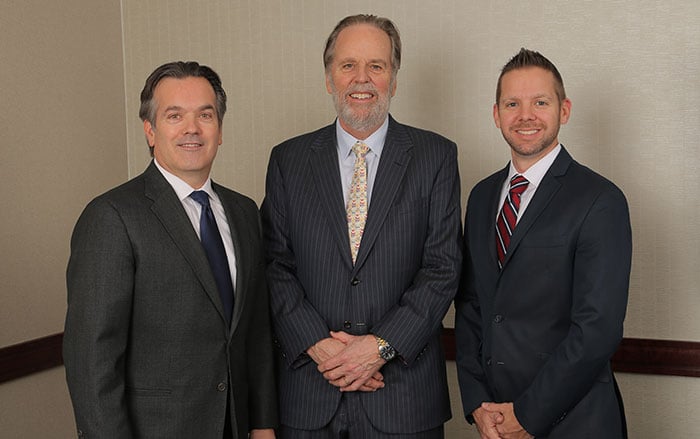Indiana – also known as the Hoosier State – lies at the crossroads of America. It is little wonder, then, that freight operations make up such a huge chunk of the state’s economy. In fact, according to the Indiana Department of Transportation, our state ranks 5th in the amount of freight transported, at a stunning 724 million tons.
Of course, more trucks on the road also increases the risk of a serious trucking accident. When a big rig or semi truck collides with a passenger vehicle, it can cause catastrophic or even fatal injuries. In these situations, a truck accident lawyer can work with you to ensure that you get the money that you deserve for your losses.
Truck accident cases are unique among motor vehicle collision cases. While some aspects are similar, certain factors – such as the existence of federal and state regulations that govern trucking – make them far more complicated. If you have been injured in a crash involving a tractor trailer, Doehrman Buba Ring will work with you to help you get the money that you deserve. Below, we outline the steps that you should take after being hurt in an Indiana truck accident.
Recognize that Truck Accidents Are Different
Every driver has to learn the rules of the road in order to get a license. For truckers, these rules of the road are far more complex. In addition to following Indiana law on driving, truck drivers also have to qualify for a Commercial Driver’s License (CDL) and follow the Federal Motor Carrier Safety Regulations (FMCSRs).
The existence of these rules means that there is often far more evidence to sift through – such as hours of service logbooks and maintenance logs. An experienced Indiana trucking accident lawyer who knows these rules can sift through the sometimes very complex evidence that is available and necessary to prove the truck driver violated these “rules of the road,” and caused an accident.
Like all personal injury cases, Indiana truck accident claims are based on a theory of negligence, which is the failure to use the level of care that a reasonable person would use in a similar situation. A truck accident lawyer should be well-versed in the FMCSRs so that they can understand the duties that these rules impose on truck drivers and trucking companies. A violation of these rules can often be used to demonstrate negligence on the part of the defendant.
The FMCSRs are voluminous. However, there are six sections of these rules that are often relevant in truck accident litigation:
- Driver Qualifications (Part 391)
- Rules of the Road (Parts 383, 392, and 395)
- Equipment, Inspection, Repair and Maintenance (Parts 393 and 396)
- Drug and Alcohol Testing (Part 382)
- Insurance coverage of MCS-90 Endorsement (Part 387)
- Hazardous Materials (Part 397)
If your attorney can demonstrate that the truck driver who caused the crash – or their employer – violated one or more of these rules, it may be sufficient to demonstrate negligence. Similarly, state rules for CDL holders can also be used to demonstrate negligence on the part of the truck driver or the trucking company.
An attorney with specific experience handling truck crashes will understand these rules and how they can be applied to your case.
Preserve Evidence
After a truck accident, you may not be able to do much to gather evidence – particularly if you have suffered serious injuries. However, there are things that you may be able to do to get the information that you need for a successful claim.
There are five pieces of evidence that your truck accident lawyer will typically need to pursue a case against the truck driver, trucking company, and their insurance company:
- Investigating officer’s assessment;
- Photographs and/or videos of the scene;
- Post-crash Department of Transportation (DOT) inspection report;
- Name and address of the driver; and
- Information about the commercial motor vehicle (CMV).
Some of these items can only be obtained after the fact, such as the initial assessment and the post-crash DOT inspection. However, there are some things that you can do (if you are able) to preserve evidence and/or make it easier for your attorney to get evidence.
First, after the collision, call 911. The responding law enforcement officers and first responders will interview witnesses and prepare a narrative report and diagram that may be useful in trucking litigation. Later, your lawyer will be able to obtain a copy of this report.
Second, if you can, take photos and videos of the accident scene and your injuries. If you can’t, the investigating officer may still take photos, which may be used by an accident reconstruction expert to determine the cause of the crash.
Third, ask for the name and address of the driver and any witnesses. This will allow your attorney to serve a lawsuit on the truck driver and find other information that may be useful in your case.
Your lawyer will take other steps to preserve evidence, such as sending a letter to the truck driver, the trucking company, and the insurance to put them on notice of pending litigation. This spoliation letter advises them of the claim and lists the type of documents and evidence that you will be seeking in litigation. If any defendants get rid of evidence after receiving this type of letter, they could face sanctions from the court.
Gather Additional Evidence
Beyond preserving evidence, you and your attorney will seek out evidence that can support your claim. This information may help you prove liability and may allow you to discover other defendants. Because witness memories tend to fade and evidence is lost over time, it is important to start gathering evidence as soon as possible after a truck accident.
This evidence often relates to the underlying cause of the accident, such as:
- Speeding
- Careless or distracted driving
- Poor vehicle maintenance
- Driver fatigue
- Driving under the influence of drugs or alcohol
- Equipment failure or defects
- Improper cargo loading.
Your lawyer will typically request a truck inspection to gather evidence related to the crash. An inspection will determine whether the semi-truck was operating and being maintained properly.
In addition, an inspection of the truck oftentimes results in data from the Electronic Data Recorder–the “black box” of the semi-truck–related to speed, throttle percentage, cruise control usage, braking, and GPS positioning, and radar records to show the relative position and speeds of the vehicles involved in a truck crash. Your attorney will also request paper and electronic records from the truck driver, trucking company, and any other defendants involved in the case.
As part of this process, your trucking accident lawyer may seek out other witnesses, including experts who can substantiate your claim. In a typical truck crash case, the following witnesses may be involved:
- The trucking company’s safety director;
- The truck driver;
- The trucking company’s dispatcher;
- A medical examiner;
- Consultants who specialize in trucking accidents;
- Medical experts; and
- Accident reconstruction experts.
While some of this evidence may be found in a standard car accident case, many are unique to trucking litigation. By working with a skilled Indiana truck accident lawyer who understands how to gather this information and seek out additional evidence, you will increase the likelihood of a favorable outcome.
Develop a Good Strategy
Litigation is about more than just filing a lawsuit and hoping for the best. Trucking companies, truckers, and insurance companies are represented by teams of lawyers and adjusters. Without a good strategy, the chances of walking away with maximum compensation are reduced.
The first – and most important – step to take is to hire a truck accident lawyer who has specific experience and skill in handling these types of cases. From there, they will help you put together a strategy that will allow you to achieve justice. This plan may include:
- Filing a lawsuit early, to avoid roadblocks thrown up by the defendants (such as claiming that they can’t turn over documents before a lawsuit is filed);
- Preserving and gathering evidence, including performing a truck inspection, getting Hours of Service logs, and obtaining pre- and post-crash inspection reports;
- Determining if there are any liability issues, including shared/comparative fault (i.e., if you are partially at fault for the accident);
- Reviewing the official reports and documentation for other potential claims;
- Analyzing the applicable insurance policies to determine coverage;
- Bringing in other parties, such as the broker, shipper, or trailer owner; and
- Consulting with expert witnesses to build a strong case.
Indiana has a two year statute of limitations, or time limit, for filing a personal injury lawsuit. For this reason, it is critical that you consult with a seasoned truck accident lawyer as soon as possible after your crash. Your attorney will get to work on your case right away to ensure that your legal rights are protected.
Hurt in a Truck Accident? We Can Help.
After a truck accident, you may be facing life-changing injuries. The thought of taking on a massive corporation may seem overwhelming, particularly when you are struggling with pain and the trauma of the accident. Our law firm is here to help.
At Doehrman Buba Ring, we are committed to fighting for the rights of accident victims throughout Indiana. Based in Indianapolis, we represent clients throughout the state on a range of personal injury matters – including truck accidents. To learn more or to schedule a free consultation with an Indiana truck accident lawyer, call our law office at 317-669-9445 or fill out our online contact form.


